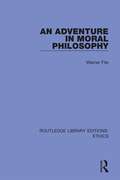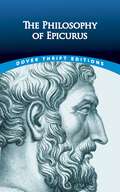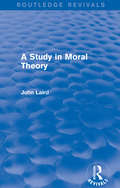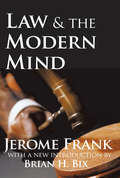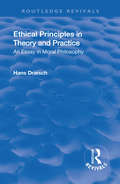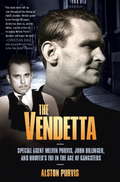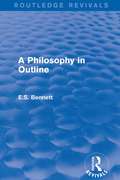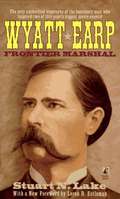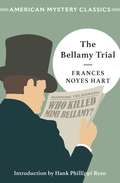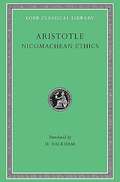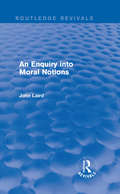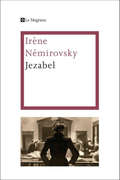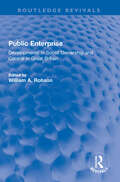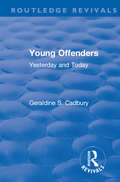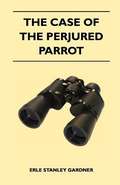- Table View
- List View
An Adventure In Moral Philosophy
by Warner FiteOriginally published in 1926, this book develops the Socratic thesis that morality is intelligence, that morality is not a matter of standards, laws and principles but in knowing what we do – in living self-consciously. The book develops this central theme in its bearings upon logic and science, art and religion and suggests that both intelligence and morality stand for much more than appears first obvious.
The Philosophy of Epicurus: Letters, Doctrines, And Parallel Passages From Lucretius (Dover Thrift Editions)
by EpicurusDespite its modern-day connotations of hedonism, "Epicureanism" has more to do with living a mindful, uncomplicated life. Epicurus — who was born at Samos, Greece, in 341 BC and died at Athens in 270 BC — founded a school of philosophy that focused on maximizing simple pleasures and minimizing pain, such as the irrational fear of death. "Death is nothing to us," declared Epicurus, "since when we are, death has not come, and when death has come, we are not." The philosopher did not believe that humans would be punished for their sins after death, and he stressed the lifelong search for lasting pleasures: tranquility, friendship, and philosophical inquiry. Although Epicurus was a prolific author, very few of his writings have survived. This volume, edited and translated by George K. Strodach, features three important letters and a collection of observations preserved by the biographer of ancient philosophers, Diogenes Laertius. Students of philosophy and ancient history will appreciate this compilation of Epicurus's enduring wisdom.
A Study in Moral Theory (Routledge Revivals)
by John LairdFirst published in 1926, this study addresses the theory of morality using four overarching approaches: analytical, psychological, theoretical, and finally, philosophical. Within these methodologies, chapters explore such areas as the character of moral enquiry, the knowledge of good and evil, freedom and self-determination and moral philosophy. This is an interesting reissue, which will be of particular value to students researching the philosophy of ethics and morality.
The Last Day, The Last Hour
by Robert J. SharpeOn 11 November 1918, the last day of the Great War, the Canadian Corps, led by Sir Arthur Currie, liberated Mons after four years of German occupation. The push to Mons in the last days and weeks of the war had cost many lives. Long after the war, Currie was blamed by many for needlessly wasting those lives. When the Port Hope Evening Guide published an editorial in 1927 repeating this charge, Currie was incensed. Against the advice of his friends, he decided to sue for libel and retained W.N. Tilley, Q.C., the leading lawyer of the day, to plead his case.First published in 1988, The Last Day, the Last Hour reconstructs the events - military and legal - that led to the trial and the trial itself, one of the most sensational courtroom battles in Canadian history, involving many prominent legal, military and political figures of the 1920s. Now back in print with a new preface by the author, judge and legal scholar Robert J. Sharpe, The Last Day, the Last Hour remains the definitive account of a landmark legal case.
The African Canadian Legal Odyssey
by Barrington WalkerThe African Canadian Legal Odyssey explores the history of African Canadians and the law from the era of slavery until the early twenty-first century. ;This collection demonstrates that the social history of Blacks in Canada has always been inextricably bound to questi52.99ons of law, and that the role of the law in shaping Black life was often ambiguous and shifted over time.Comprised of eleven engaging chapters, organized both thematically and chronologically, it includes a substantive introduction that provides a synthesis and overview of this complex history. This outstanding collection will appeal to both advanced specialists and undergraduate students and makes an important contribution to an emerging field of scholarly inquiry.
Law and the Modern Mind
by Jerome Frank Brian H. BixLaw and the Modern Mind first appeared in 1930 when, in the words of Judge Charles E. Clark, it "fell like a bomb on the legal world." In the generations since, its influence has grown-today it is accepted as a classic of general jurisprudence.The work is a bold and persuasive attack on the delusion that the law is a bastion of predictable and logical action. Jerome Frank's controversial thesis is that the decisions made by judge and jury are determined to an enormous extent by powerful, concealed, and highly idiosyncratic psychological prejudices that these decision-makers bring to the courtroom.
Revival: An Essay in Moral Philosophy (Routledge Revivals)
by Hans DrieschAlmost all the existing modern systems of Ethics deal with formal definitions, and at bottom repeat more or less the same thing about them in slightly different words. In this work these are a side issue, and therefore are treated briefly. Their treatment in Section I is based upon the author’s theoretical works the Theory of Order and the Theory of Reality, but will be intelligible to those who are not acquainted with those works. The chief concern is moral teaching – that is, the practical element.
The Vendetta: Special Agent Melvin Purvis, John Dillinger, and Hoover's FBI in the Age of Gangsters
by Alston PurvisIn "The Vendetta," author Alston Purvis recounts the story of his father, Melvin Purvis, the iconic G-man and public hero made famous by his remarkable sweep of the great Public Enemies of the American DepressionOCoJohn Dillinger; Pretty Boy Floyd, and Baby Face Nelson. PurvisOCOs successes led FBI boss J. Edgar Hoover to grow increasingly jealous, to the point where he vowed to bring down Purvis. Hoover smeared PurvisOCOs reputation, and tried to erase his name from all records of the FBI's greatest triumphs. This book sets the record straight, and provides a grippingly authentic new telling of the gangster era, seen from the perspective of the pursuers. "
A Philosophy in Outline (Routledge Revivals)
by E.S. BennettFirst published in 1931, this book provides a brief overview of the essentials of philosophy. It aims to combat the notion of the inaccessibility of philosophy by providing an introduction to its history and what the author believes to a ‘minimum dose…of incontrovertible philosophical truth’. The book merely assumes an ordinary level of adult education and offers an outline of the key areas of philosophy — consciousness, reality, experience, Life, God, love, aesthetics, conduct, logic — and as such will be of interest as a very useful starting point for anyone wishing to undertake further studies.
The Bellamy Trial
by Frances Noyes HartA scandalous murder trial reaches the heart of high society'An enthralling story' NEW YORK TIMESThe trial of Stephen Bellamy and Susan Ives, accused of murdering Bellamy's wife, lasts eight days. That's eight days of witnesses (some reliable, some not), eight days of cross-examination, and eight days of sensational courtroom theatrics lively enough to rouse the judge into frenzied calls for order. As each witness is brought to the stand, the mystery of the case only increases in all its sordid detail. By the time the closing arguments are made, the verdict shocks the entire courtroom.
The Case of the Sulky Girl
by Erle Stanley GardnerTHE CASE OF THE SULKY GIRL was only the second of the Perry Mason books ever written, published in September 1933. Perry, Della and Paul Drake all appear. And for the first time, Mason's young law clerk Frank Everly. Still no appearance by District Attorney Hamilton Burger or Lieutenant Tragg. But this is the first Perry Mason story to feature his courtroom manipulations. The story has a beautiful young blond with a fiery temper, Frances Celane, being blackmailed. Her uncle and guardian, Edward Norton, won't give her any money from her trust, so that she can pay off the blackmailer. And so before you know it, he's dead and she's accused of his murder. She's secretly been married, and that's the basis for the blackmail. Did her new husband do it? He says so, but Perry suspects he's just trying to cover for his new bride. Obviously, his client is innocent. (Aren't they always?) So just who did murder Edward Norton?
Aristotle: Nicomachean Ethics (Second Edition) (Loeb Classical Library #XIX)
by H. Rackham AristotleNearly all the works Aristotle (384-322 BCE) prepared for publication are lost; the priceless ones extant are lecture-materials, notes, and memoranda (some are spurious). They can be categorized as practical; logical; physical; metaphysical; on art; other; fragments.
The Case of the Howling Dog
by Erle Stanley GardnerIn this story, Arthur Cartright seeks out Perry Mason's advice on a neighborhood dog that keeps him awake with its howling. Seems like a strange premise for a story. But before you know it, things blossom and Perry is in the middle of another murder. Cartright's neighbor is dead; Cartright has disappeared; and Cartright's wife, who was posing as the neighbor's wife, is accused of the murder.
The Case of the Caretaker's Cat
by Erle Stanley GardnerTHE CASE OF THE CARETAKER'S CAT was the seventh Perry Mason mystery that Erle Stanley Gardener wrote. Our story opens as Charles Ashton seeks the advice of Perry Mason. His previous employer, Peter Laxter, now deceased, left a provision in his will that Ashton, a faithful caretaker, would always have a job with his heirs. But one of the heirs, the nasty Samuel C. Laxter, has decided that Ashton's cat must go. Poor old Clinkers the cat must leave or Samuel Laxter threatens to poison him. Perry takes the case, probably out of sheer boredom. He's just finished a murder trial, and there's nothing interesting on his desk. But before you know it, Ashton is dead; strangled. And then old Peter Laxter's nurse turns up dead, too. Maybe Peter Laxter's death wasn't an accident, either! And just who is getting blamed for all these deaths? Young Douglas Keene, the fiance of beautiful young Winifred Laxter, the only Laxter heir that DIDN'T inherit under the strange will. Up steps Perry Mason to defend the innocent young man. And so he does in his usual flamboyant style. Perry appears along with Della Street, his faithful secretary. and Paul Drake, his detective friend. District Attorney Hamilton Burger shows up just long enough to speak a paragraph's worth of dialog. But what a paragraph it is!
An Enquiry into Moral Notions (Routledge Revivals)
by John LairdFirst published in 1935, this book compares and examines what John Laird termed the ‘three most important notions in ethical science’: the concepts of virtue, duty and well-being. Laird poses the question of whether any one of these three concepts is capable of being the foundation of ethics and of supporting the other two. This is an interesting reissue, which will be of particular value to students researching the philosophy of ethics and morality.
The Case of the Sleepwalker's Niece
by Erle Stanley GardnerPerry Mason is engaged by beautiful young Edna Hammer who's worried that her uncle, Peter B. Kent, is sleepwalking again. Last time he was sleepwalking, he carried a butcher knife, and his then-wife Doris Sully Kent felt he was trying to murder her. She since filed for divorce and left the household. But Peter Kent is up to his old tricks again, and young Edna is afraid that his business partner Frank B. Maddox is the new intended victim.
Jezabel
by Irène NémirovskyUn agut relat d'Irène Némirovsky, l'obra va ser acollida amb entusiasme no només a França: el New York Times la va considerar en el seu moment «la successora de Dostoievski» A la sala d’un tribunal se celebra el judici d'una dona. Gladys Eysenach ja no és jove, però ha estat molt bonica. Se l'acusa d'haver assassinat el seu amant, molt més jove que ella. Els testimonis van desfilant i l'advocat i el fiscal s'enfronten. Asseguda al recinte dels acusats, la protagonista sent fragments de la narració de la seva pròpia vida: la infantesa, l'exili, l'absència del pare, el matrimoni, les relacions tumultuoses amb la seva filla, l'edat i el declivi, fins a l'acte irreparable. Els membres del jurat i el públic remuguen, s'encenen. Però el culpable qui és? L'acusada? O el temps que fa bocins les il·lusions?
The Case of the Lame Canary
by Erle Stanley GardnerPerry Mason senses from his first glance that the shapely young woman carrying a caged canary is involved in much more than a traffic accident, and as usual, his hunch proves right.
Public Enterprise: Developments in Social Ownership and Control in Great Britain (Routledge Revivals)
by William A. RobsonFirst Published in 1937, Public Enterprise presents a broad overview of the numerous public boards and commissions established in Britain during early twentieth century. These bodies have been entrusted with the operation of vital public utilities and the regulation or organization of national industries. The book discusses leading examples such as the Port of London Authority; the British Broadcasting Corporation; the Central Electricity Board; the London Passenger Transport Board; the Coal Mines Reorganization Commission; and the Public Service Board, to showcase their importance in the economic and social life of the community. This book is a must read for scholars and researchers of business and economics, British politics, and political science.
The Case of the Substitute Face
by Erle Stanley GardnerDuring a dark and stormy night aboard ship, a man goes missing. A portrait photograph is mysteriously changed out of a frame. Perry Mason must solve the mystery to save a life.
Excellent Intentions (British Library Crime Classics #0)
by Richard HullWITH AN INTRODUCTION BY MARTIN EDWARDS 'From the point of view of the nation, it's a good thing that he died.' Great Barwick's least popular man is murdered on a train. Twelve jurors sit in court. Four suspects are identified - but which of them is on trial? This novel has all the makings of a classic murder mystery, but with a twist: as Attorney-General Anstruther Blayton leads the court through prosecution and defence, Inspector Fenby carries out his investigation. All this occurs while the identity of the figure in the dock is kept tantalisingly out of reach. Excellent Intentions is a classic crime novel laced with irreverent wit, first published in 1938.
The Life of Sir Hersch Lauterpacht
by Elihu LauterpachtHersch Lauterpacht, of whom this book is an intimate biography by his son, Elihu, was one of the most prolific and influential international lawyers of the first half of the twentieth century. Having come to England from Austria in the early 1920s, he first researched and taught at the London School of Economics before moving to Cambridge in 1937 to become Whewell Professor of International Law. He did valuable work to enhance relations with the United States during the Second World War, and was active after the war in the prosecution of William Joyce and the major Nazi war criminals. For ten years he was also involved in various significant items of professional work and in 1955 he was elected a judge of the International Court of Justice. The book contains many extracts from his correspondence, the interest of which will extend to lawyers, historians of the period and beyond.
Revival: Yesterday and Today (Routledge Revivals)
by Geraldine S. CadburyThis unusual book tells vividly the story of children who have broken the law and their treatment from the time of King Athelstan to present day. With few exceptions, they suffered for centuries the same harsh treatment as older men and women, and it was only gradually that the terrible conditions in the prisons in this and other countries improved The early experiments in wiser treatment are graphically described and the efficacy of modern reformative measures is clearly demonstrated Legislation affecting young offenders is explained and the book should prove most valuable to all those who have responsibility for dealing with difficult children
The Case of the Perjured Parrot
by Erle Stanley GardnerWhen eccentric millionaire Fremont Sabin is murdered in his mountain cabin, his talking parrot is replaced by a screaming imposter. Sabin's son, Charles, and his wife accuse each other. Charles hires attorney Perry Mason to find his father's killer. 1939.
